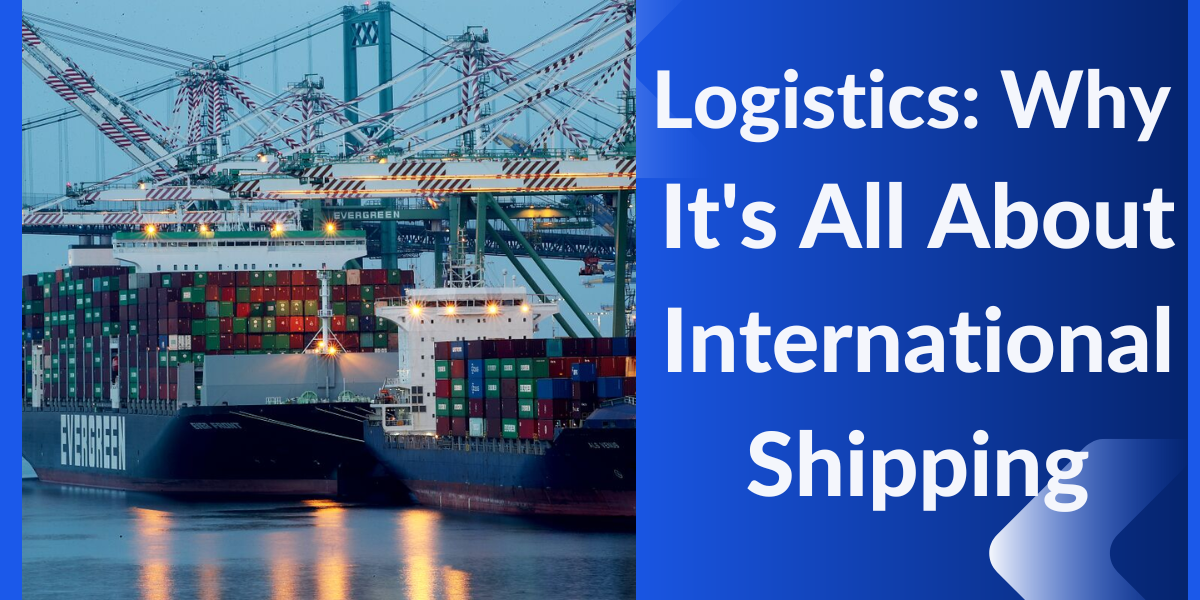Logistics: Why It’s All About International Shipping

Logistics is a term that gets thrown around a lot, but what does it actually mean? In short, logistics is the coordination and management of the flow of resources between point A and point B. But in a global economy, logistics is so much more than that. Logistics has become increasingly complex as businesses expand their reach to new markets and consumers. In this blog post, we will explore the world of logistics and how international shipping has become such a crucial part of it. From e-commerce to manufacturing, read on to learn more about how logistics is shaping the world around us.
What is logistics?
Logistics is the process of planning, implementing, and controlling the efficient, effective flow of goods, services, and information from point of origin to point of consumption. It is a critical component of the supply chain and plays a vital role in many businesses.
There are three main types of logistics: Inbound logistics, Outbound logistics, and Third-party logistics. Each type has its own unique set of activities and processes.
Inbound logistics refers to the process of receiving and handling incoming goods or materials. This includes receiving orders from customers, unpacking and inspecting goods, storing them in a warehouse or other storage facility, and delivering them to the customer or production line when needed.
Outbound logistics refers to the process of shipping finished products or materials from a company to its customers. This includes picking and packing orders, loading them onto trucks or other transportation vehicles, and shipping them to the customer’s location.
Third-party logistics (3PL) refers to the use of an outside company to handle all or part of a company’s logistics activities. This can include transportation, warehousing, order fulfillment, customer service, etc.
What are the different types of logistics?
There are many different types of logistics, but they all revolve around the efficient movement of goods and materials. The most common type of logistics is transportation logistics, which focuses on getting goods from one place to another as quickly and efficiently as possible. Other types of logistics include inventory management, warehousing, and supply chain management.
If You are Lookig For Best Logistics Company In Dubai then Click On The Blow Button.

What are the benefits of logistics?
Logistics is the process of planning, implementing, and controlling the efficient, effective flow of goods and services from point of origin to point of consumption. It is a critical component of any business or organization that relies on the movement of goods or materials.
There are many benefits to having an effective logistics system in place. Perhaps the most obvious benefit is that it can save the company money. A well-run operation will minimize waste and maximize efficiency, which can lead to lower costs. In addition, good logistics can help improve customer satisfaction by ensuring that products or materials arrive on time and in good condition.
It can also help businesses expand into new markets or geographical areas, as well as manage seasonal fluctuations in demand. And finally, good logistics management can help reduce environmental impact by minimizing unnecessary transportation and handling of goods.
What are the challenges of logistics?
There are many challenges that come with managing logistics, especially when shipping internationally. One of the biggest challenges is ensuring that all of the products arrive at their destination safely and on time. This can be a difficult task when dealing with different time zones, customs regulations, and other potential delays.
Another challenge is coordinating all of the different aspects of the shipping process, such as transportation, warehousing, and packaging. This can be a complex and time-consuming task, particularly when shipping to multiple destinations.
Finally, logistics managers must constantly strive to improve efficiency and reduce costs. This can be a challenging task, as there are many factors to consider when planning shipments. However, by using the latest technology and carefully analyzing data, logistics managers can find ways to streamline the shipping process and save money.
How to overcome the challenges of logistics?
There are many challenges that can come up when shipping internationally, but with careful planning and execution, these challenges can be overcome. Here are some tips on how to overcome the challenges of logistics:
- Make sure you have a clear understanding of all the regulations and requirements for shipping to your destination country. This includes things like customs regulations, import/export taxes, and any other restrictions that may apply.
- Choose a reliable shipping partner who has experience shipping to your destination country. They will be able to help you navigate the complexities of international shipping and make sure your shipment arrives safely.
- Plan your shipments well in advance. This will give you time to research the best shipping routes, rates, and partners for your needs. It will also allow you to account for any potential delays that could occur during transit.
- Be prepared for unexpected costs. When shipping internationally, there are always potential unforeseen costs that can arise (customs fees, duties, etc.). Make sure you have a budget in place to cover these costs so they don’t come as a surprise.
- Keep good communication with your shipping partner throughout the process. This way if there are any issues or delays, you will be kept in the loop and can work together to resolve them quickly.


